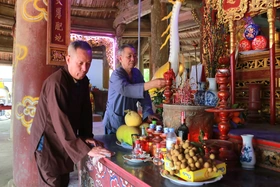{title}
{publish}
{head}
Every spring, millions of Vietnamese people eagerly make a pilgrimage to Phu Tho, the homeland of the Vietnamese people and the cradle of Lac Viet civilization, to pay tribute to their ancestors. At the same time, they immerse themselves in the deep cultural heritage of the region through unique festivals and traditions, shaping the cultural identity of the Ancestral Land.

On February 12, 2025, the Hung King Festival will feature a reenactment of the traditional rice planting ceremony.
Joining the crowd at Hung Temple to worship at the beginning of the year, Ms. Nguyen Thi Thuy from Long Bien, Hanoi, shared: "Every year, after the first lunar month, my family’s first destination is Hung Temple, the sacred site dedicated to the first Hung Kings of Vietnam. We respectfully offer incense in gratitude for the Hung Kings' contributions while also praying for a year of peace, luck, and happiness for our loved ones."
In the crisp spring air, the natural landscape harmonizes with the temple’s ancient ambiance. The ringing of bells and the fragrant scent of incense and flowers enhance the sacred atmosphere of Hung Temple.
After years of restoration and development, the site has become more spacious and beautiful. Traffic safety, security, and public order have been well maintained. Visitors receive attentive guidance and support, ensuring a smooth and respectful pilgrimage experience.
Dressed in graceful ao dai, Ms. Hoang Thi Hue and her husband, Keacing Andrew from Australia, eagerly watched the Hung King Festival’s rice planting reenactment. Mr. Andrew seized the opportunity to capture footage of the reenactment of King Hung teaching people how to plant rice. He shared:"Since my wife is from here, she told me about this unique festival, which represents Vietnam’s rice farming tradition dating back to the Hung King era. I truly enjoyed experiencing the festival alongside the locals." According to Ms. Hue, this is Mr. Andrew’s first Tet returning to Vietnam to celebrate with his wife.
In most localities of the province, spring festivals have become important cultural gathering places, such as the Hung King Festival’s rice planting reenactment (Viet Tri City); Great Mother Au Co Temple Festival (Ha Hoa District); Lang Suong Temple Festival (Thanh Thuy District); Tro Tram Festival and Princess Festival (Lam Thao District); and the Muong people’s going-to-the-field festival (Thu Cuc Commune, Tan Son District).
These events provide opportunities for people to express gratitude to their ancestors, uphold the tradition of “remembering the source when drinking water,” celebrate the beauty of daily life and traditional crafts, and express their hopes for a peaceful and prosperous year.
To enhance the spring tourism experience, the Department of Culture, Sports, and Tourism has partnered with local authorities, tourism promotion centers, and travel agencies to promote strengths, develop innovative tourism products, and diversify experiences. Unique attractions have been introduced to draw visitors, including the Great Mother Au Co Temple Tour (Ha Hoa District), Hung King Temple, Hung Lo Communal House and Ancient Village (Viet Tri City)...
At the same time, efforts have been strengthened to ensure well-managed and orderly festival activities, contributing to a safe, civilized, and exemplary festival season that brings the image of the Ancestral Land closer to people across the country and international friends.
Phu Tho is known as the birthplace of the Vietnamese nation, boasting a rich history, culture, and civilization with over 300 traditional festivals. These folk festivals, deeply rooted in the community’s cultural space, carry profound historical and spiritual significance, reflecting intangible heritage passed down through generations.
In addition to traditional rituals, many festivals feature folk games and cultural activities such as shuttlecock kicking, chess, traditional dancing, and other festivities, creating a lively atmosphere that attracts large crowds of visitors.
Ngoc Tuan

baophutho.vn On the morning of July 30, at Thuong Temple on Nghia Linh mountain within the Hung King Temple Historical Site, a delegation from the...

baophutho.vn Following the reorganization of commune-level administrative units, the Muong Vang region, formerly part of Lac Son district, was restructured...

baophutho.vn On the quiet Hill 79 in Hoa Binh Ward, nestled in the heart of the city along the Da River, lies a memory zone that quietly preserves the...

baophutho.vn The traditional art of creating skirt patterns among the Muong people, originally in Hoa Binh province, now part of Phu Tho province, has been...

baophutho.vn The Ministry of Culture, Sports, and Tourism has officially released the latest List of National Intangible Cultural Heritages, with the newly...

baophutho.vn The project to merge the three provinces of Phu Tho, Vinh Phuc, and Hoa Binh into a new Phu Tho province places high demands on solidarity and...

baophutho.vn With the desire not only to preserve the cultural space of the ancient Muong people but also to build a high-quality tourism destination rich...

baophutho.vn The Ministry of Culture, Sports and Tourism has officially recognized two traditional festivals in Phu Tho province as National Intangible...

baophutho.vn Phu Tho—the land of national origins—is home to more than 1,064 valuable historical and cultural relics. In recent years, efforts to enhance...

baophutho.vn For generations, ethnic minority communities in Thanh Son District have steadfastly preserved their traditional cultural values—woven deeply...

baophutho.vn Phu Tho, the ancestral land of the Vietnamese people, is home to numerous historical relics, cultural sites rich in spiritual significance, and...

baophutho.vn In January, as spring arrives, the land and sky of Phu Tho bloom with new life, villages are adorned in fresh colors, and the people’s hearts...